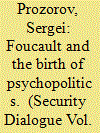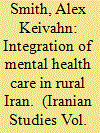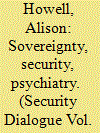|
|
|
Sort Order |
|
|
|
Items / Page
|
|
|
|
|
|
|
| Srl | Item |
| 1 |
ID:
184794


|
|
|
|
|
| Summary/Abstract |
Based upon fieldwork at India’s National Institute of Mental Health and Neurosciences (NIMHANS), I trace the contours of hysteria as an enduring, albeit informal, analytic that continues to disturb neuropsychiatric reductionism within psychiatry. I argue that at this historical moment, the political and economic demand for singular identities out of more porous cultural life-worlds (e.g. ethnic, religious, linguistic, occupational) produces clinical subjects incapable of nuance and flexibility, hastening a host of possessive, literalist, legalist and ‘hysteric’ symptoms that overtake India’s most vulnerable modern subjects, fuelling the sense of a crisis in search of a pharmaceutical solution to a psychopathological diagnosis.
|
|
|
|
|
|
|
|
|
|
|
|
|
|
|
|
| 2 |
ID:
182653


|
|
|
|
|
| Summary/Abstract |
The article contributes to the genealogy of current tendencies in crisis governance by reconstructing Michel Foucault’s analysis of the application of the notion of crisis in 19th-century psychiatry. This analysis complements and corrects Reinhart Koselleck’s history that viewed crisis as originally a medical, judicial or theological concept that was transferred to the political domain in the 18th century. In contrast, Foucault highlights how the psychiatric application of the concept of crisis was itself political, conditioned by the disciplinary power of the psychiatrist. Unlike the ancient medical concept of crisis that emphasized the doctor’s judgement in observing the event of truth in the course of the disease, psychiatric crisis is explicitly forced by the doctor in order to elicit the desired symptoms in the patient and convert their power of disciplinary confinement into medical diagnosis. The article argues that this notion of crisis resonates with the tendencies observed in contemporary crisis governance in Western societies. While these tendencies are often addressed in terms of ‘psychopolitics’ that presumably succeeds Foucault’s ‘biopolitics’, we suggest that Foucault’s own work on psychiatric power offers a valuable genealogical perspective on the contemporary governance of crises.
|
|
|
|
|
|
|
|
|
|
|
|
|
|
|
|
| 3 |
ID:
171091


|
|
|
|
|
| Summary/Abstract |
Iran’s rural mental health care system emerged in a context that included experiments in health care prior to the 1979 Revolution and the establishment of a primary health care (PHC) system after the Revolution. Beginning in the 1980s, Iran integrated mental health care into the existing PHC system by treating mental illness much like a communicable disease. Iran advanced treatment options compatible with the existing system, added new training for existing care providers, and incorporated specialists. The integration of mental health care led to the rapid improvement of health outcomes. The integration also created the unintended consequence of privileging pharmaceutical treatments and overlooking mental illnesses affected by somatization.
|
|
|
|
|
|
|
|
|
|
|
|
|
|
|
|
| 4 |
ID:
099565


|
|
|
|
|
| Publication |
2010.
|
| Summary/Abstract |
This article examines how psychiatry has been used as a technology of security in post-'liberation' Iraq. Drawing on Foucault and Foucauldian work on the history and sociology of medicine, it begins by tracing how, from the 19th century onwards, psychiatry has instantiated its authority through a claim to provide social security within national spaces, both through methods of sovereign confinement and through liberation and governance. Arguing that the various 'psy' disciplines - and medicine more generally - are increasingly used as technologies of security internationally, the article examines psychiatric practice in Iraq, where patients in the Al Rashad psychiatric institution were accidentally liberated from their confinement by US Marines in 2003. Iraq's 'mentally ill' were initially considered a manageable security threat and thus subject to liberal community governance efforts. Yet, after the so-called suicide bombing of two pet markets in 2008, reportedly by former Al Rashad patients, those deemed 'mentally ill' and others associated with them were once again made subject to sovereign confinement, marking a failure in liberal governance. Thus, this article seeks to explore some of the complex lines connecting sovereignty,
|
|
|
|
|
|
|
|
|
|
|
|
|
|
|
|
|
|
|
|
|